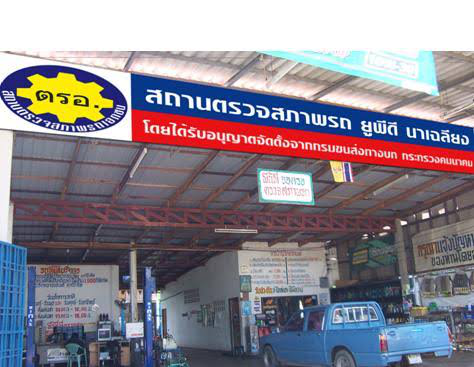
Vehicle Registration Renewal in Thailand
Genreal Infromation:
All vehicles in Thailand must maintain a valid vehicle registration. Extending or renewing your registration (the tax sticker on the front of your car) each year is fairly simple, especially if your car or motorbike is less than five years old. It can be done quickly at the Department of Land Transport (https://www.dlt.go.th/en/) Office in your area given you have the following documents.
Required Documents:
- Your vehicle book or a photocopy if you are paying a credit
- Proof of payment for next year’s PRB (Compulsory Motor Insurance)
Registration fees:
The fee will vary according to the type and age of your vehicle. You should expect to pay around 300 to 400 baht for a new tax sticker for your motorbike and between 1,000 to 7,000 baht for your car. For example, the cost of renewing a Toyota Altis 1.8’s registration is roughly 2,000 baht. For the first five years, the fees will remain constant, after which it will be reduced by 10% every year up to a maximum reduction of 50%.
Vehicle Inspection:
Vehicles that are older than five years are required to undergo a technical inspection from a certified service center before the application for registration renewal. This will cost you around 200 baht and should only take a few minutes. All certified service centers will have the blue and yellow gear-shaped logo on it’s sign, like the ones in the two photographs below


The inspection will include a car number verification as well as an inspection of the lights, brakes, and exhaust. Afterwards, the center will issue a certificate for you to present with your application along with the other two requirements.
Understanding the Importance of Vehicle Registration Renewal
In Thailand, as with many countries around the globe, renewing your vehicle registration is not just a bureaucratic step, but a crucial one in ensuring road safety and proper tracking of vehicles on the roads. It is the government’s way of ascertaining that vehicles plying the roads meet the minimum safety standards and are covered by the Compulsory Motor Insurance (PRB).
The Value of a Timely Renewal
Being diligent with your renewal process not only helps you avoid potential penalties but also ensures that your vehicle remains compliant with Thai laws. It’s not uncommon for drivers to face complications, like fines or other penalties, for driving vehicles with expired registrations. Additionally, in case of an accident, an expired registration can lead to complications with insurance claims.
Embracing the Digital Age
While the Department of Land Transport still necessitates an in-person visit for renewals, the digital world is rapidly transforming the automotive landscape in Thailand. The website of the Department of Land Transport is becoming increasingly user-friendly, offering a plethora of information and guidance for vehicle owners. Making use of online resources can provide clarity and streamline the renewal process.
Support for Foreigners in Thailand
For foreigners residing in Thailand, navigating the local bureaucratic procedures can sometimes be daunting. Language barriers, local customs, and the nuances of Thai regulations might feel overwhelming. Fortunately, services like Thai Drivers License Service exist to bridge this gap, offering expertise and support in not just language translation but understanding the nuances of the procedures.
Summary:
- If you are living in Thailand, you must renew your vehicle registration every year at an office of the Department of Land Transport for the price of 1,000 to 7,000 baht
- Luckily, all you need is (1) your vehicle book or a photocopy if you are paying a credit, (2) proof of payment for next year’s PRB, and if your vehicle is older than five years (3) a certificate from a certified inspection center.
At Thai Drivers License Service, we understand that your time is valuable and would like to take your vehicle registration renewal off your hands. Here’s what we can do. If you have any questions feel free to contact us with the form below!
if you want to learn more about our services click HERE
FAQ: Vehicle Registration Renewal in Thailand
1. How often do I need to renew my vehicle registration in Thailand?
All vehicles must renew their registration annually to maintain a valid vehicle registration in Thailand.
2. Do new vehicles also need to undergo a technical inspection?
No, only vehicles that are older than five years require a technical inspection from a certified service center before registration renewal.
3. What is the PRB?
PRB stands for Compulsory Motor Insurance, which provides basic coverage in case of accidents. Proof of payment for the next year’s PRB is a necessary document for registration renewal.
4. Can I renew my vehicle registration if I don’t have the original vehicle book with me?
Yes, a photocopy of the vehicle book is acceptable, especially if you’re paying a credit.
5. What are the criteria checked during the technical inspection?
The inspection primarily focuses on verifying the car number, ensuring that the lights, brakes, and exhaust are in good working condition.
6. What if my vehicle fails the technical inspection?
If your vehicle fails the technical inspection, you’ll need to address the issues mentioned and then bring it back for a re-inspection before you can renew the registration.
7. Is the vehicle registration renewal fee constant every year?
For the first five years, the fee remains constant. After that, the fee reduces by 10% each year up to a maximum reduction of 50%.
8. How can I identify a certified service center for the technical inspection?
All certified service centers sport a blue and yellow gear-shaped logo on their signage.
9. What does the registration renewal fee include?
The fee typically covers the new tax sticker for your vehicle, which is a mandatory requirement.
10. Can Thai Drivers License Service handle the renewal process on my behalf?
Yes, Thai Drivers License Service offers services to manage your vehicle registration renewal, ensuring a hassle-free experience. For more information on what they can assist you with and their fees, you can contact them directly or visit their website.
Note: Regulations and requirements can change, so always ensure that you check for the most recent information from official sources or trusted agencies like Thai Drivers License Service.

